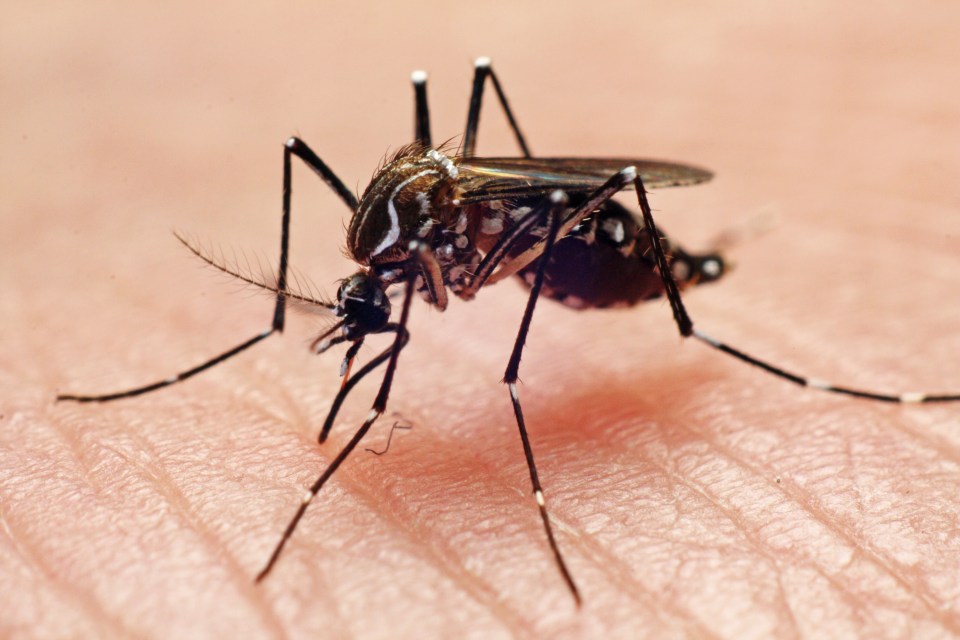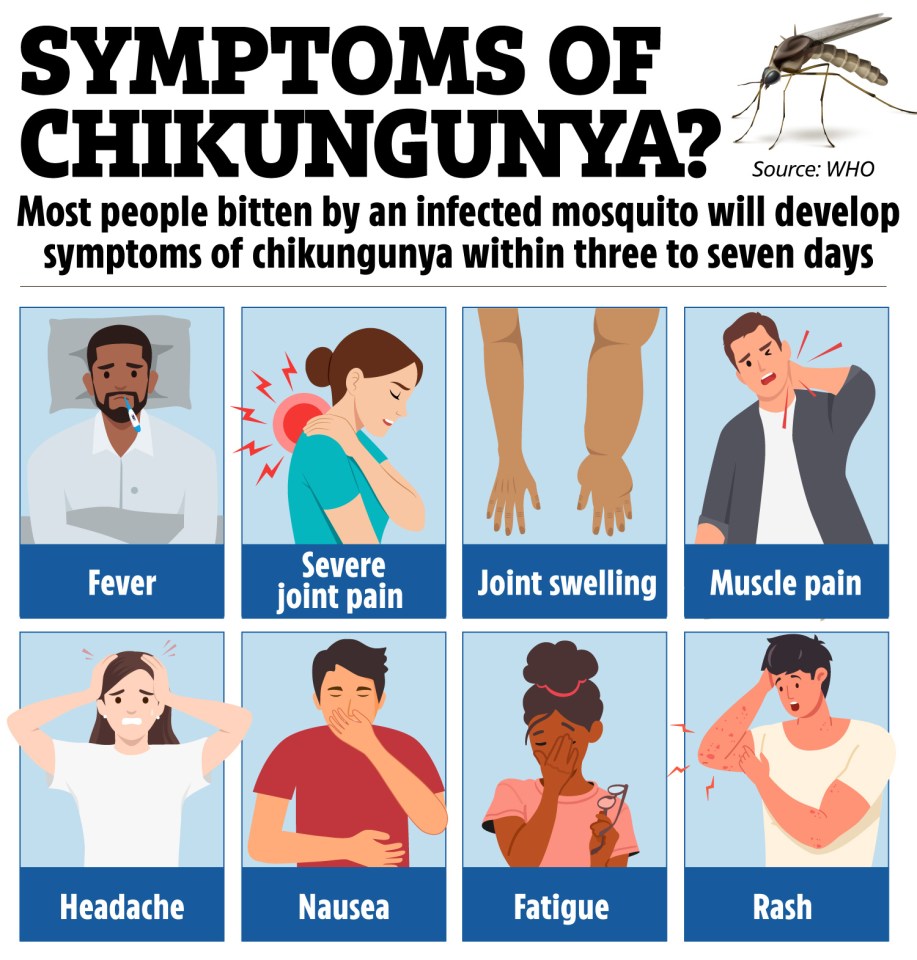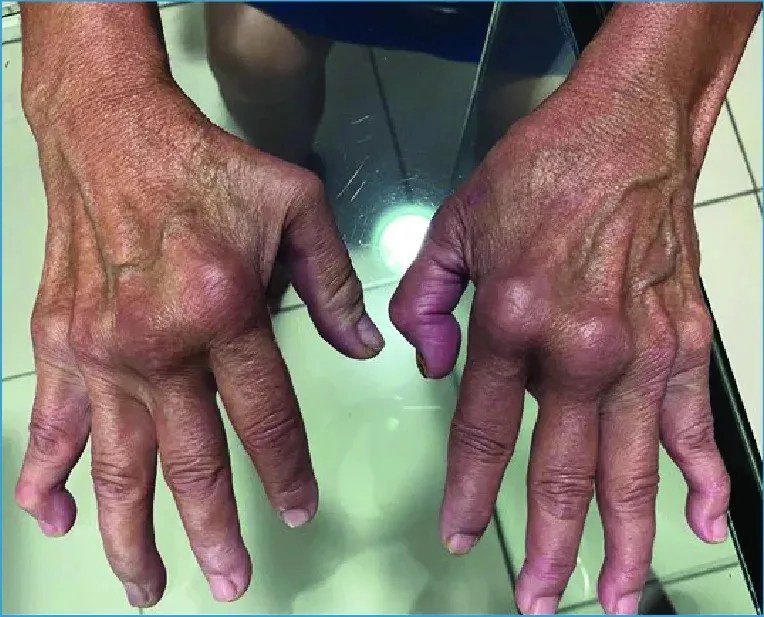CASES of a killer virus that can make the body “fold in on itself” have increased in the UK, health chiefs have warned.
There were 73 cases of chikungunya, a mosquito-borne disease that causes crippling joint pain, between January and June 2025 in England, Wales and Northern Ireland – the highest number ever recorded.
This is over double the 27 cases reported during the same period in 2024, UK Health Security Agency (UKHSA) data from its most recent travel-associated infection report suggests.
The first cases of the oropouche have also been reported in the UK, which were all linked to travel from Brazil.
The oropouche virus, dubbed ‘sloth fever‘, circulates between primates, sloths, and birds in the wild – before it is occasionally passed to humans by midges and mosquitoes.
It is primarily found in the Amazon basin in South America, but in recent years has started spreading more widely around the Americas.
Health officials have since urged people to take precautions against insect bites while on holiday, as cases of both infections surge.
Chikungunya spreads through the bite of infected Aedes mosquitoes, particularly Aedes aegypti and Aedes albopictus species.
The virus is rarely deadly, but can cause serious disease spread by the in the very young, older people and those with other underlying illnesses.
Typical symptoms include:
- Excruciating joint pain, which can leave victims hunched or folded over in agony
- High fever
- Headache
- Muscle aches
- Nausea
- Fatigue
- Red, bumpy rash
- Swelling in the joints, particularly the hands and feet
In severe cases, the joint pain can mimic arthritis, leaving sufferers temporarily disabled for months or even years.
The illness mainly occurs in Africa and Asia, specifically southern Asia, although cases have been reported in Europe and parts of North America.
However, this year there have been outbreaks in the Americas and Asia, with surges in China and the Indian Ocean islands of Reunion, Mayotte and Mauritius.
The majority of UK cases reported this year were linked to travel to Sri Lanka, India and Mauritius.
All cases were reported in England, primarily in London.
There is currently no risk of onward transmission of chikungunya, as the two species of mosquito that transmit the disease are not established in the UK, UKHSA said.
Meanwhile, more than 7,000 people have been struck down by the virus in China since June 2025, according to national health officials.
The majority of cases have been reported in Foshan, a city in southern Guangdong province, where officials have since rolled out Covid-style lockdowns in a desperate bid to stop the virus from spiralling out of control.
At least 12 other cities in the southern Guangdong province have also reported infections. Hong Kong and Taiwan have also reported cases.
Dr Philip Veal, consultant in public health at UKHSA, said: “Chikungunya can be a nasty disease and we’re seeing a worrying increase in cases among travellers returning to the UK.
“While this mosquito-borne infection is rarely fatal, it can cause severe joint and muscle pain, headaches, sensitivity to light and skin rashes.
“Thankfully, symptoms usually improve within a few weeks, but joint pain may last for months or longer.”
He added: “It is essential to take precautions against mosquito bites when travelling.
“Simple steps, such as using insect repellent, covering up your skin and sleeping under insecticide-treated bed nets can greatly reduce the risk.”
Two chikungunya vaccines are approved for use in the UK and are available to buy after an assessment at a private travel clinic.
Meanwhile, three cases of oropouche virus have been detected by UKHSA.
How concerning is this outbreak in China?
Though tactics adopted by authorities in China hark back to lockdown measures five years ago, chikungunya “does not pose the same level of pandemic threat as a virus like Covid-19”, according to Prof Tom Solomon, director of The Pandemic Institute in Liverpool.
Dr César López-Camacho, from the Jenner Institute at the University of Oxford, added: “It is extremely unlikely to cause a pandemic in the traditional sense, as chikungunya does not spread from person to person.
“However, it can cause large regional outbreaks, especially when introduced to mosquito-rich, low-immunity settings, like what we are probably seeing in China.”
The risk to the UK from this outbreak is “currently low” as Aedes mosquitoes, which tend to carry the virus, aren’t widespread here.
“But we do need to watch closely, as climate change and global travel are expanding the range of these mosquitoes, and with it, the viruses they carry,” Dr López-Camacho warned.
“It is also important that genetic sequencing of the virus in this outbreak is carried out.
“In past outbreaks, mutations have helped chikungunya adapt to new mosquito species.
“If the virus has changed, we need to ensure current vaccines still offer protection.”
Brits travelling to China amidst the outbreak should “be cautious”, the disease expert said.
He continued: “The US Centre for Disease Control and Prevention has issued a Level 2 travel alert, recommending travellers use insect repellent, wear long sleeves, and stay in screened or air-conditioned accommodation.
“Travellers returning from affected areas who develop fever and joint pain should seek medical attention and mention their recent travel.”
People travelling to high-risk areas where outbreaks of the virus often occur can get vaccinated against chikungunya at a travel clinic.
But Prof Solomon noted: “There have been reports of serious side effects in people over the age of 65.
“As such, the vaccine is currently recommended for travellers under 65 visiting high-risk areas.”
The flu-like illness can cause a fever, headaches, joint pain, muscle pain, chills, nausea and vomiting.
Officials urged anyone who becomes unwell with these symptoms after travel to affected areas, including parts of Central and South America and the Caribbean, to seek urgent medical advice.
According to the World Health Organisation (WHO), before late 2023, oropouche virus was mostly reported near the Amazon rainforest area.
However, in 2024, Brazil, Bolivia, Colombia, Cuba, Guyana, Peru and the Dominican Republic reported locally transmitted cases of the disease.
The UKHSA report also shows a rise in travel-associated cholera cases in the UK, with eight cases in the first half of the year compared to just one in 2024.
Most cases were linked with travel to India and Ethiopia.
There was also a 67 per cent decrease in the number of dengue cases reported in England, Wales and Northern Ireland from January to June.
And there were just four cases of zika virus during the period, down from nine in 2024.
Oropouche virus: Everything you need to know
Oropouche fever is a disease caused by Oropouche virus
It is spread through the bites of infected midges (small flies) and mosquitoes.
Symptoms of Oropouche fever are similar to dengue and include headache, fever, muscle aches, stiff joints, nausea, vomiting, chills, or sensitivity to light.
Severe cases may result in brain diseases such as meningitis.
Symptoms typically start 4–8 days after being bitten and last 3–6 days.
Most people recover without long-term effects.
There are no specific medications or vaccines are available.
Precautions
Travellers heading to affected areas should take steps to avoid bug bites.
The virus is endemic in many South American countries, in both rural and urban communities.
Outbreaks are periodically reported in Brazil, Bolivia, Colombia, Ecuador, French Guiana, Panama, Peru, and Trinidad and Tobago.
Wear tops with long sleeves and long trousers, apply insect repellent regularly, and sleep under a mosquito net if you are not in enclosed, air-conditioned accommodation.
Source: US Centre for Disease Control and Prevention

















